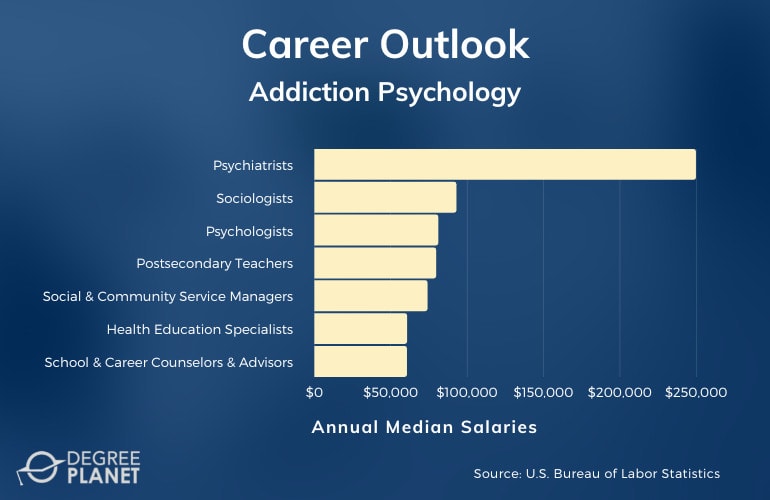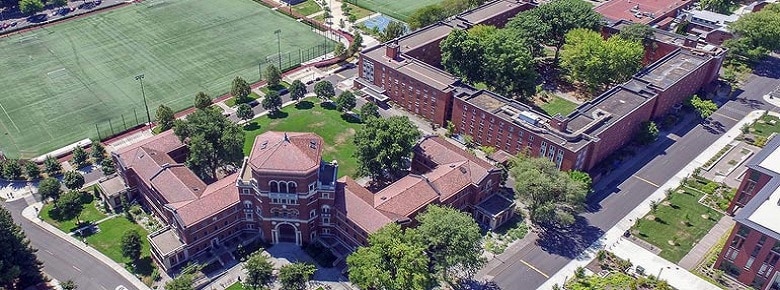Earning your PhD in Addiction Psychology can help you develop the skills to study and treat addiction in your community. It may also provide you with the opportunity to qualify for a rewarding job or to advance your current career in the field.
![Best Online PhD in Addiction Psychology [Doctorate Guide]](https://www.degreeplanet.com/wp-content/uploads/2022/06/best-online-phd-in-addiction-psychology-doctorate-guide.jpg)
Addiction psychology is the study of addictive behaviors. While this includes the abuse of alcohol, nicotine, and other drugs, it also includes behaviors like excessive shopping, gambling, or eating.
Editorial Listing ShortCode:
Students and professionals who pursue a PhD in this field may find themselves tackling addiction through research, counseling, or academic pursuits.
PhD in Addiction Psychology Online Programs

Substance abuse is a problem that affects a large portion of the population. Earning a doctoral degree in addiction psychology could help you play an essential role in aiding those who struggle with addictive behaviors.
A Ph.D. in Addiction Psychology is a specialized counseling degree that focuses primarily on research and evidence-based practices. A degree program in addiction psychology examines the behavioral, social, emotional, and neurological roots of addiction. It also teaches students to apply principles and theories to addictive behaviors as a way to better understand the psychology of substance abuse.
If your goal is to work with individuals one-on-one, another degree option to consider is a PhD in Addiction Counseling. This route prepares you for the challenge of working in a clinical setting and providing treatment and therapy to individuals suffering from addiction.
Editorial Listing ShortCode:
Both an addiction counseling doctorate degree and a PhD in Addiction Psychology can provide career opportunities in academia, research, counseling, or public policy. Coursework may include subjects like:
- Family studies
- Pharmacology of addiction
- Addiction treatment
- Counseling skills and techniques
- Diversity and social justice
There are many avenues you can pursue with an online degree in addiction psychology or addiction counseling.
If you are wanting to work as a psychiatrist, psychologist, or postsecondary teacher, you may benefit from a substance abuse PhD. Some professionals also find fulfilling positions as counselors in the fields of:
- Mental health
- Substance abuse
- Behavioral disorders
Completing a PhD in Addiction Studies can be a strategic way to make a difference in this field. Your research may even effect change in the way the public health system views and treats those suffering from addiction.
Addiction Psychology and Counseling Careers & Salaries

Academia, public policy, and clinical research are just some of the related job fields with career opportunities available to professionals with a PhD in Addiction Studies.
Many states are implementing programs that provide treatment and counseling as an alternative to jail time for individuals charged with drug offenses. Some professionals provide substance abuse counseling to veterans struggling with addiction due to post-traumatic stress.
Many clinics are now required to present data to demonstrate the outcomes of their programs. Qualified researchers may monitor the performance of these treatment centers and evaluate the success of their methods.
According to the Bureau of Labor Statistics, the following are possible career opportunities that could benefit from doctoral studies in addiction psychology.
| Careers | Annual Median Salaries |
| Psychiatrists | $249,760 |
| Sociologists | $92,910 |
| Psychologists | $81,040 |
| Postsecondary Teachers | $79,640 |
| Social and Community Service Managers | $74,000 |
| Health Education Specialists | $60,600 |
| School and Career Counselors and Advisors | $60,510 |
| Social Workers | $50,390 |
| Marriage and Family Therapists | $49,880 |
| Substance Abuse, Behavioral Disorder, and Mental Health Counselors | $48,520 |
Some of these career paths require additional licensure or further education. Psychiatrists, for example, go through medical school.
It is common for students who’ve earned their substance abuse PhD to go on to work as counselors or clinical psychologists with a specialty in addiction. These are not the only paths available, though. Many graduates go on to pursue opportunities as teachers, non-clinical psychologists, or researchers.
Editorial Listing ShortCode:
Some professionals who specialize in addiction may even develop and set into motion public awareness campaigns that emphasize substance abuse prevention in their community.
Addiction Psychology PhD Curriculum & Courses

There is a wide range of coursework in the field of addiction psychology, and the classes you take will depend on the program you choose. While some programs emphasize addiction research and theory, others may focus on individual counseling.
Here are some examples of courses you may encounter:
- Research Methods: In this class, you’ll learn the fundamentals of doctoral-level research and focus on critical evaluation, research ethics, and proposal development.
- Addictive Behaviors and Substance Abuse: This course examines the thought patterns and behaviors that can cause an individual to be at risk for substance abuse.
- Family Systems Approaches to Addiction: In this course, you’ll review the theories for successful family intervention and examine the connection between addiction and family dynamics.
- Counseling Skills and Techniques: This course helps prepare you for the challenge of addiction counseling by covering the techniques and theories of one-on-one treatment.
- Group Therapy: In this class, you’ll learn strategies for substance abuse treatment that are centered on group counseling and support.
- Advanced Analysis and Design: Through this course, you can develop an understanding of the applied research skills necessary for qualitative and quantitative analysis.
- Addiction Intervention: This course teaches intervention-based strategies to prepare you for the challenge of guiding family interventions.
- Professional Growth: The work of a substance abuse counselor can be personally challenging, so this course provides you with strategies for personal wellbeing and healthy, effective practices.
- Clinical Survey of Substance Abuse: In this class, you’ll cover the theoretical, biological, socio-cultural, and legal perspectives of substance-related psychological disorders.
- Diversity and Social Justice: Throughout this course, you can develop an understanding of how race, gender, and class affect addiction and treatment.
Most programs will require the completion of a dissertation in addition to your coursework. Some may include residencies or field-study as part of their completion requirements.
Choosing an Online PhD in Addiction Psychology Program

There are many online programs available for students looking to earn their PhD in Addiction Psychology. When determining which program is best for you, you might want to keep the following points in mind:
- Program cost. Earning a degree online is often a more affordable alternative to traditional attendance, but it’s beneficial to review your eligibility for in-state tuition and to understand all fees associated with your program.
- Your long-term goals. Determining what it is you want to do with your degree can help you look for a program that will align with your professional goals. Some programs concentrate on addiction counseling, while others focus on non-clinical addiction psychology.
- Program length. Some programs require residency or field-study components, which may increase a program’s completion time.
Additionally, it’s strategic to verify the regional and programmatic accreditation of the school you wish to attend.
Admissions Requirements

The admission requirements for doctoral programs in addiction psychology vary depending on the school. Some programs require applicants to meet a minimum GPA to be admitted. Additional criteria may include:
- GRE scores (only some schools require them)
- Master’s degree in a related field
- Current resumé
- Graduate academic writing sample
- Academic transcripts
While most programs do not require prior work experience or licensure, they may favor applicants who have completed internships or worked in a mental health field. Some schools may also ask for a cover letter detailing why you’ve chosen to pursue this degree at their institution.
Accreditation

When you’re researching various doctoral programs, you can narrow down your options by checking which schools are accredited. Regional accreditation is a rigorous review process that determines the academic quality of colleges and universities. Institutions of higher education must meet pre-determined criteria to be eligible for accreditation.
Editorial Listing ShortCode:
Employers often prefer candidates who hold accredited degrees, and an accredited education is a common prerequisite for licensure and certifications as well. In addition, accredited schools generally only accept transfer credits from other accredited institutions and programs.
Financial Aid and Scholarships

Federal aid, private scholarships, and work-study programs are all potential methods for funding your PhD in Addiction Studies.
Your school’s financial aid office can offer you guidance on how to apply for scholarships either through your school or through private organizations. Some employers offer scholarship programs for employees seeking higher education. You may also find scholarship opportunities through academic fraternities or social and cultural organizations.
If you require additional aid, filling out the Free Application for Federal Student Aid (FAFSA) is the first step to applying for federal or state loans. While student loans have to be repaid after graduation, they tend to have lower interest rates than private loans.
What Can You Do with a PhD in Addiction Psychology?

A degree in addiction studies can open the door to a variety of needed and fulfilling career opportunities. According to the Bureau of Labor Statistics, a few of the industries that employ individuals in the field of addiction psychology include:
- Outpatient care centers
- Psychiatric hospitals
- State and local governments
- Physicians’ offices
- Mental health and substance abuse facilities
Graduates may pursue careers as psychiatrists, psychologists, postsecondary teachers, social workers, or substance abuse counselors, among many other opportunities. Most counseling roles require state licensure, and psychiatrists must also complete medical school.
Whether you choose to work in academia, public policy, counseling, or research, a substance abuse PhD can provide you with many ways to serve your community.
How Long Does It Take to Get a Doctorate in Addiction Psychology Online?

In general, a PhD takes 3 to 5 years to complete. The length of time it takes to complete a doctorate program in addiction psychology varies depending on the program’s format and number of credit hours. Your enrollment status and course load can impact your time to completion as well.
Some universities now offer accelerated psychology degrees online or on campus for those students needing complete their degrees faster. A dissertation will also lengthen the time it takes to finish your program. If no dissertation is required, a doctoral program may be completed in 3 years with full-time study. Part-time students may take longer to finish their degree.
What’s the Difference Between a PsyD vs. PhD in Addiction Psychology Program?
A Doctor of Philosophy (PhD) and a Doctor of Psychology (PsyD) in Addiction Psychology are comparable degrees. They can both be beneficial to students looking for advanced career opportunities in the field of psychology.
| PhD in Addiction Psychology | PsyD in Addiction Psychology |
|
|
While a PsyD focuses more on clinical training and a PhD on research, both degrees cover research methods and patient care to different extents.
Is a PhD in Addiction Psychology Degree Worth It?

Yes, a PhD in Addiction Psychology degree is worth it for many professionals. The Bureau of Labor Statistics reported 23% job growth for substance abuse, behavioral disorder, and mental health counselors over the next ten years. This projected growth is much faster than average, and it demonstrates the growing need for professionals in this field.
Editorial Listing ShortCode:
If you are looking to make a difference in your community by studying the psychology of addiction, you might consider earning your PhD. A doctoral degree in addiction studies can help you develop new substance abuse treatment plans, facilitate community outreach, or publish academic work.
Universities Offering Online Doctorate in Addiction Psychology Degree Program
Methodology: The following school list is in alphabetical order. To be included, a college or university must be regionally accredited and offer degree programs online or in a hybrid format.

Adler University offers a Doctor of Psychology in Clinical Psychology. The program seeks to empower psychologists by helping them develop the tools needed to become socially responsible clinicians.
There are several emphases that students in the program can choose. Options include Clinical Neuropsychology, Advanced Alderian Psychotherapy, and Substance Abuse Treatment. Students may also choose Child and Adolescent, Military Clinical, Primary Care, or Traumatic Stress Psychology.
Adler University is accredited by the Higher Learning Commission.

The Doctor of Behavioral Health – Clinical program at Arizona State University is intended for students with a master’s level education. The curriculum is designed to provide advanced, hands-on experience in behavioral interventions, medical sector jobs, and business principles. The program consists of a 400 hour internship and 18 classes that are each 7.5 weeks long.
Arizona State University is accredited by the Higher Learning Commission.

Barry University offers a Doctor of Philosophy in Counseling. It emphasizes a blend of research, hands-on experience, and traditional instruction.
The curriculum covers therapeutic concepts and skills, like counseling, counselor education, supervision, leadership, and advocacy. Prior to graduation, students are expected to complete an internship in each of the following categories: supervision, teaching, and leadership and advocacy.
Barry University is accredited by the Southern Association of Colleges and Schools Commission on Colleges.

Students interested in developing advanced skills in clinical psychology may be interested in the Doctor of Psychology at California Southern University.
The program aims to develop several important skills, including how to communicate psychological ideas in writing and speech. Other topics covered include how to differentiate between normal and abnormal behaviors, utilize psychometric theory in assessments, and develop evidence-based treatment plans.
CalSouthern is accredited by the WASC Senior College and University Commission.

Capella University offers a Doctor of Psychology. The curriculum emphasizes the understanding and assessment of human behavior and the utilization of clinical assessment tools and treatment plans.
The program includes traditional coursework, residencies, clinical practicums, internships, and research. It aims to ensure all students have hands-on experience and dedicated class time to prepare for the demands of practice.
Capella University is accredited by the Higher Learning Commission.

Carlow University’s Doctor of Psychology in Counseling Psychology is framed around social justice. It aims to graduate students who are attuned to underserved populations and can differentiate between psychological distress and the impacts of institutional disparities. The program consists of 93 credit hours that can be earned on campus or online. Students can potentially complete the program in just 4 years.
Carlow University is accredited by the Middle States Commission on Higher Education.

The Doctor of Counseling Psychology program at Felician University is designed to prepare students for licensure and entry-level clinical roles. Students can typically finish the program in 4 to 5 years. Students with qualifying master’s degrees need to complete 73 credits of instruction, while students with qualifying bachelor’s degrees are required to complete 88 credits.
Felician University is accredited by the Middle States Commission on Higher Education.

Fielding Graduate University’s Doctor of Philosophy in Clinical Psychology program is accredited by the American Psychological Association.
It is designed for busy professionals who want to further their education while honoring existing schedules and commitments. Within the general program requirements, students can choose to specialize in Forensic Psychology, Social Justice and Diversity, Neuropsychology, or Health Psychology.
Fielding Graduate University is accredited by the Western Association of Schools and Colleges.

Indiana University offers a Doctor of Philosophy in Addiction Neuroscience. It is designed for students interested in pursuing careers in research-oriented behavioral and brain sciences and professional interests in the behavioral neurobiology of drug abuse. The program’s curriculum covers cover key concepts like behavioral neuroscience, psychopharmacology, drug abuse, motivation and reward, and behavior genetics.
Indiana University is accredited by the Higher Learning Commission.

Lesley University offers a Doctor of Philosophy in Expressive Therapies. The program is designed from the belief that creativity is an essential partner to scholarship and collaboration in the clinical psychology profession.
The program utilizes a low-residency model. It aims to provide instruction in fundamental skills and concepts while ensuring the flexibility needed for students to mold their education around existing commitments.
Lesley University is accredited by the New England Commission of Higher Education.

The Doctor of Psychology in Clinical Psychology program at Meridian University aims to help students develop their professional, clinical, and research skills. It is designed to prepare students for a variety of positions in the psychology profession. The program accepts applications quarterly, offers classes fully online or in a hybrid model, and can typically be completed in 3 to 4 years.
Meridian University is accredited by the WASC Senior College and University Commission.

Mississippi College offers a Doctorate in Professional Counseling program that can be earned fully online and consists of 72 credit hours. Students may select their own areas of interest, such as addiction therapy or eating disorder treatment, and customize their coursework around their career goals.
Mississippi College is accredited by the Southern Association of Colleges and Schools Commission on Colleges.

Oregon State University offers a Doctor of Philosophy in Counseling. The program is intended for students with master’s degrees in counseling or closely linked fields who want to deepen their knowledge in order to work as advanced practitioners. This 150 credit program is delivered using a hybrid online and in-person learning format.
Oregon State University is accredited by the Northwest Commission on Colleges and Universities.

Pacifica Graduate Institute offers a Doctor of Philosophy in Depth Psychology with a specialization in Integrative Therapy and Healing Practices. The program uniquely combines instruction in traditional therapeutic strategies and applied healing techniques with the goal of teaching students how to treat clients holistically. Courses cover topics such as Jungian psychology, neurobiology, cultural healing, and eco-spirituality.
Pacifica Graduate Institute is accredited by the WASC Senior College and University Commission.

Regent University offers an online program for a Doctor of Philosophy in Counseling and Psychological Studies. It is designed for students interested in pursuing psychology careers in mental health counseling, research, education, and psychological science. The specialization in Addictions Counseling focuses on how to assess, diagnose, and treat individuals navigating substance abuse and dependency.
Regent University is accredited by the Southern Association of Colleges and Schools Commission on Colleges.

Saybrook University offers a Doctor of Philosophy in Clinical Psychology. It aims to help students develop knowledge and practical skills in the field. The curriculum covers data and meta-analysis, psychotherapy, and developmental, child and adolescent, multi-cultural, and humanistic-integrative therapy. With full-time attendance, students can typically complete this fully online program in 5 years.
Saybrook University is accredited by the Senior Commission of Western Association of Schools and Colleges.

The Doctor of Psychology program at the University of Arizona offers specializations in Criminology and Justice Studies and Health and Wellness Psychology. Students take one course at a time, and classes are usually 6 to 9 weeks long. They may transfer in up to 30 qualifying credits from outside institutions toward the 62 required to graduate.
The University of Arizona is accredited by the Higher Learning Commission.

The University of the Cumberlands offers a Doctor of Philosophy in Counselor Education. It is intended for students interested in working as counseling psychologists, professional counselors, compliance managers, psychology professors, or risk managers. The program’s flexible online learning format is designed to help working professionals fit their education around existing schedules.
The University of the Cumberlands is accredited by the Southern Association of Colleges and Schools Commission on Colleges.

The University of West Georgia offers a Doctor of Education in Professional Counseling and Supervision. The core of the program’s curriculum aims to help students harness advocacy and leadership skills in their counseling careers. Students must attend an on-campus orientation the summer they are admitted into the program. All other classes and coursework are completed asynchronously online.
The University of West Georgia is accredited by the Southern Association of Colleges and Schools Commission on Colleges.

Walden University offers a Doctor of Philosophy in Counselor Education and Supervision with a concentration in Addiction Counseling. This specialization is designed to provide a comprehensive education in addictive behaviors, treatments, and interventions. Key concepts covered in the curriculum include professional ethics, quantitative reasoning, clinical supervision, and counseling assessment.
Walden University is accredited by the Higher Learning Commission.
Earning Your PhD in Addiction Psychology Online

The overall aim of a doctoral program in addiction psychology is to prepare students and working professionals for their long-term goals in the field of psychology.
This degree may help qualify you for academic or government research, professorship, or counseling in a clinical setting. If you have a passion for breaking down the stigmas surrounding addiction and are ready to take your education to the next level, consider applying for your PhD in Addiction Psychology.
The sooner you start exploring accredited universities, the sooner you may find the online addiction psychology PhD program that best fits your personal needs and professional goals.

